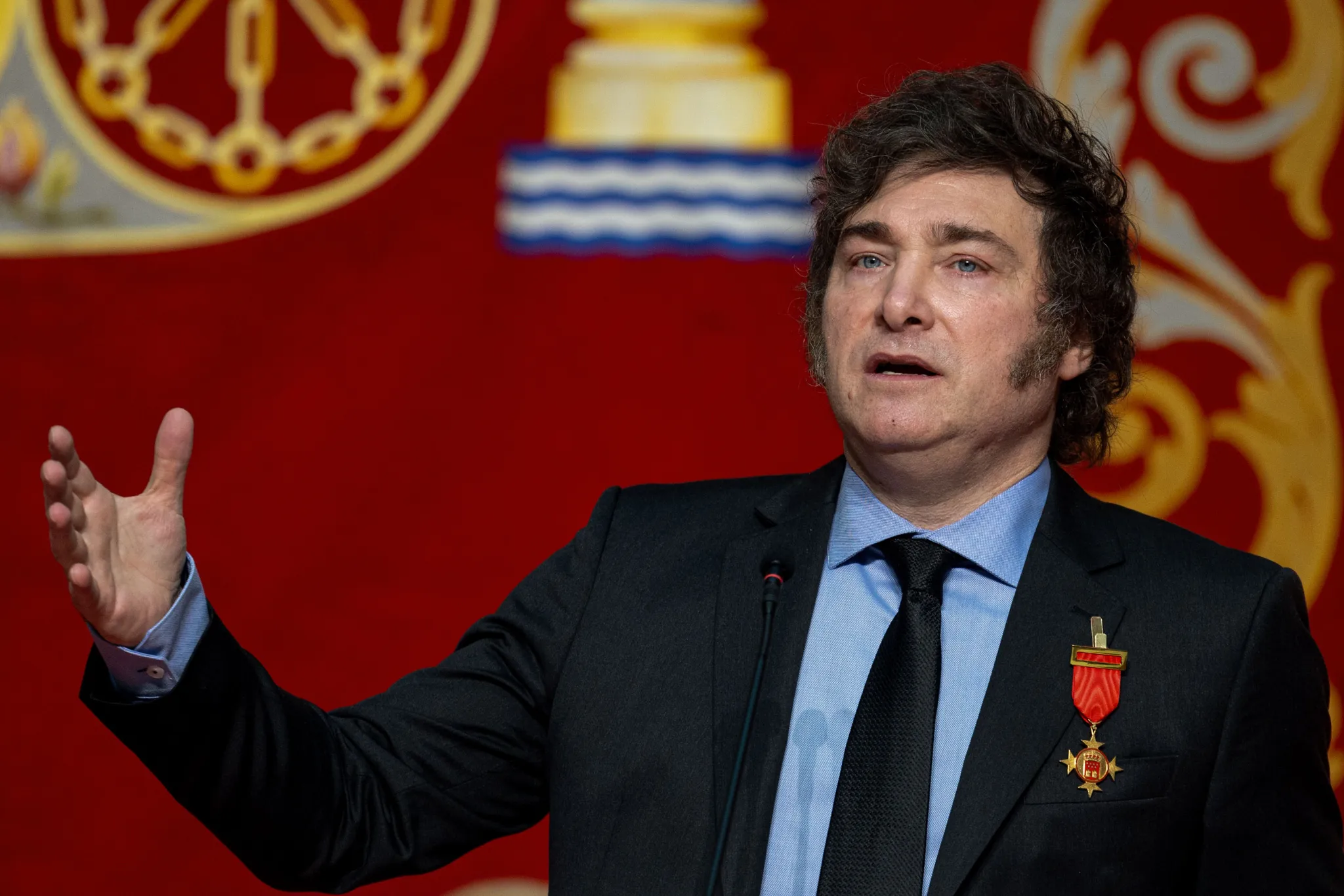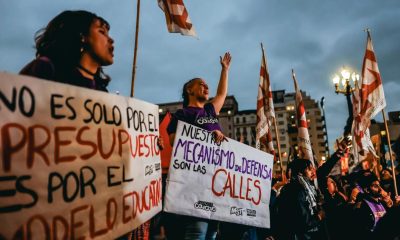International
Investment and technology, keys to the economic relationship between Argentina and Germany

The relationship between Argentina and Germany – a country to which President Javier Milei will make a working visit this weekend – is based on foreign investment, cooperation in natural resources and trade exchange, supported by bilateral agreements and joint projects to promote economic and technological development in both countries.
Milei is scheduled to travel tomorrow, Saturday, to Germany, where he will be awarded in Hamburg (north) the Hayek medal that the homonymous society awarded him due to his achievements as a “reformer”.
The next day, the Argentine president and the German Chancellor, Olaf Scholz, will hold a meeting in Berlin at the head of their respective delegations.
Germany has shown interest in cooperating with Argentina in the exploration and production of critical minerals such as lithium and copper, essential for the energy transition and the manufacture of batteries. This aligns with Germany’s efforts to diversify its sources of supply and reduce dependence on China.
In 2023, the stock of total Foreign Direct Investment (FDI) in Argentina ammounted to 128,855 million dollars (about 120,382.7 million euros), which represents 10.4% more than the previous year and 26.4% of the Gross Domestic Product (GDP), according to data from the Ministry of Foreign Affairs.
The upward trend of FDI continues in 2024, with various sectors such as lithium extraction, hydrocarbons and financial technology attracting a considerable amount of foreign investment.
Germany – an important investor in the automotive, technology and manufacturing industry – is in eighth place in FDI in Argentina, after the United States, Spain, Brazil, the Netherlands, Chile, China and Italy.
In 2023, German companies in Argentina made a significant investment in various sectors.
A survey by the Argentine-German Chamber of Industry and Commerce (AHK) and the consultancy EY Argentina revealed that 74% of German companies planned to invest more than one hundred million dollars (about 93.42 million euros) in the South American country. These investments were mainly used for fixed assets and the incorporation of technology.
Germany’s FDI stock in Argentina is mainly focused on the manufacturing (35%), mineral and oil extraction (22.3%), and retail and wholesale sectors (10.9%).
German companies such as Siemens, Volkswagen and Bayer have a strong presence in Argentina, promoting innovation and technology transfer in various industries.
Projects and cooperation in critical minerals are another key point of the economic relationship between the two countries, since Argentina is one of the main producers of lithium, essential for the manufacture of batteries, and that in 2022 exports of this element increased by 234%.
In February 2024, representatives of Germany and Argentina discussed cooperation in the supply chain of critical minerals, such as copper and lithium, with the aim of reducing dependence on China.
Regarding Argentine investment in Germany, which is less significant, companies from the South American country are beginning to explore opportunities in high-tech and renewable energy sectors.
In terms of cooperation and strategic alliances, both countries have signed bilateral agreements to encourage investment and facilitate trade. Argentina and Germany collaborate in infrastructure and technological development projects, taking advantage of the German experience in these fields.
Trade between Argentina and Germany includes Argentine exports of agricultural and mineral products, and imports of German machinery and industrial products. This exchange is fundamental for the Argentine economy and benefits both countries by diversifying their markets.
In 2022, total trade between Germany and Argentina exceeded $3.6 billion, with a growth of 8% compared to 2021.
In March 2024, Germany exported products worth 169 million euros (181 million dollars) to Argentina and imported goods for 104 million euros, resulting in a positive trade balance of 65.3 million euros (70 million dollars) for Germany.
Exports from Germany to Argentina include machinery, vehicles, chemicals and pharmaceuticals. The European nation is a key supplier of advanced technologies and industrial equipment necessary for various sectors of the Argentine economy.
Meanwhile, imports from Germany from Argentina focus on agricultural products and food, such as soybeans, wine and meat, as well as minerals.
The commercial relationship benefits from the complementarity between the economies, where Argentina provides raw materials and food, and Germany provides technology and manufactured products.
Both countries are working on closing a free trade agreement between the European Union (EU) and Mercosur, which could further enhance trade exchange and open up new business opportunities.
This agreement has been the subject of long negotiations and currently faces significant opposition from several EU member countries, especially France and Austria.
In contrast, countries such as Germany, Spain and Portugal are in favor of moving forward with the agreement, highlighting the economic benefits and the need to strengthen trade relations with Latin America.
International
Football Fan Killed in Clashes After Colombian League Match

Fans of Cúcuta Deportivo and their traditional rivals Atlético Bucaramanga clashed outside the stadium following their local league match on Tuesday, leaving one supporter dead and several others injured.
The deceased fan was stabbed, according to a senior police official in Cúcuta who confirmed the cause of death in a video statement. Local media reported that the victim was a supporter of the visiting team, Atlético Bucaramanga.
The match ended in a 2-2 draw. Authorities had banned the entry of Atlético Bucaramanga’s organized supporters into the stadium in an effort to prevent disturbances.
Despite the restrictions, violence broke out in the surrounding areas after the game. Among the injured were three police officers, an institutional source told AFP.
The incident adds to a series of recent violent episodes linked to Colombian football. The most recent occurred in December, when supporters of Atlético Nacional and Independiente Medellín clashed in the stands and on the pitch, leaving 59 people injured.
International
Missing Spanish Sailor Rescued After 11 Days Adrift in Mediterranean

The man had departed from the port of Gandía, on Spain’s eastern coast, with the intention of reaching the southern Spanish town of Guardamar del Segura, a journey of about 150 kilometers, a spokesperson for Spain’s maritime rescue service told AFP.
Search boats and aircraft were deployed on January 17, but the operation was called off on January 22 after efforts proved unsuccessful. Alerts were then issued to vessels navigating the area in case they spotted any signs of the missing sailor.
As hopes were fading, a surveillance aircraft from the European Union’s border agency Frontex spotted the sailboat on Tuesday, along with a person signaling for help, approximately 53 nautical miles northeast of Bejaia, Algeria.
A nearby vessel, the Singapore-flagged bulk carrier Thor Confidence, carried out the rescue and is expected to bring the man to an end to his ordeal when it arrives on Thursday in the southern Spanish port city of Algeciras.
Maritime rescue services shared images on social media showing a small white sailboat drifting at sea and secured alongside the much larger ship.
It remains unclear how the sailboat ended up hundreds of kilometers off its intended route or how the man managed to survive for so long alone in open waters.
International
Rubio Says U.S. Could Participate in Follow-Up Russia-Ukraine Talks

The United States could join a new round of talks this week aimed at ending Russia’s invasion of Ukraine, Secretary of State Marco Rubio said on Tuesday.
Teams from Kyiv and Moscow met last Friday and Saturday in Abu Dhabi in their first publicly acknowledged direct negotiations to discuss the peace initiative promoted by former U.S. President Donald Trump.
“They are going to hold follow-up talks again this week,” Rubio told the Senate Foreign Relations Committee. “There could be U.S. participation.”
However, Rubio suggested that Washington’s role may be more limited than during last week’s discussions, which included Steve Witkoff, the president’s special envoy, and Jared Kushner, Trump’s son-in-law.
The secretary of state indicated that progress may have already been made on security guarantees for Ukraine, one of Kyiv’s key demands in any agreement with Moscow after nearly four years of Russian invasion.
“There is one remaining issue that everyone is familiar with, and that is the territorial claim over Donetsk,” Rubio said, referring to the eastern Ukrainian region that Russia wants Ukraine to cede.
“I know that active efforts are underway to see whether the positions of both sides on this issue can be reconciled. It remains a bridge we have not yet crossed,” he added during the hearing.
Rubio acknowledged that the territorial question would be particularly difficult for Ukraine to resolve.
-

 Central America3 days ago
Central America3 days agoGuatemala seizes over a ton of cocaine hidden in flour at Pacific port
-

 International5 days ago
International5 days agoTrump-Era Defense Plan Prioritizes Border Security and Scales Back Global Commitments
-

 International5 days ago
International5 days agoBogotá and Quito Seek Dialogue After Tariffs and Power Cut Escalate Tensions
-

 International4 days ago
International4 days agoDelcy Rodríguez seeks political agreements after Maduro’s ouster
-

 International3 days ago
International3 days agoHistoric snowstorm paralyzes Toronto after 60 centimeters of snow
-

 International3 days ago
International3 days agoSpain’s irregular migrant population rises to 840,000, study finds
-

 International4 days ago
International4 days agoFederal immigration agents kill man in Minneapolis, sparking protests and outrage
-

 Central America2 days ago
Central America2 days agoGuatemala Police Arrest Prison Guard Caught in the Act of Extortion
-

 Central America2 days ago
Central America2 days agoHonduras swears in conservative president Asfura after disputed election
-

 Central America2 days ago
Central America2 days agoBukele leads public trust rankings as UCA survey highlights gains in security
-

 International2 days ago
International2 days agoWinter Storm Fern Leaves 30 Dead and Over One Million Without Power Across the U.S.
-

 Sin categoría2 days ago
Sin categoría2 days agoEight Killed in Series of Armed Attacks in Ecuador’s Manabí Province
-

 International3 days ago
International3 days agoRights group says nearly 6,000 killed in Iran protest crackdown
-

 International2 days ago
International2 days agoDoomsday clock moves to 85 seconds before midnight amid rising global risks
-

 International11 hours ago
International11 hours agoFootball Fan Killed in Clashes After Colombian League Match
-

 International3 days ago
International3 days agoVenezuela frees at least 80 political prisoners, NGO says
-

 International2 days ago
International2 days agoSpain approves plan to regularize up to 500,000 migrants in Historic Shift
-

 Sin categoría2 days ago
Sin categoría2 days agoEl Salvador Launches Fourth Year of Ocean Mission to Protect Marine Ecosystems
-

 International11 hours ago
International11 hours agoRubio Says U.S. Could Participate in Follow-Up Russia-Ukraine Talks
-

 International3 days ago
International3 days agoEU launches new probe into X over AI-generated fake nude images
-

 International11 hours ago
International11 hours agoMissing Spanish Sailor Rescued After 11 Days Adrift in Mediterranean
-

 Central America11 hours ago
Central America11 hours agoGuatemala President Says Starlink Terminal Found Inside Prison
-

 International3 days ago
International3 days agoSevere winter storm grips U.S., leaves multiple dead as extreme cold persists
-

 International3 days ago
International3 days agoFrance debates ban on social media for children under 15








































